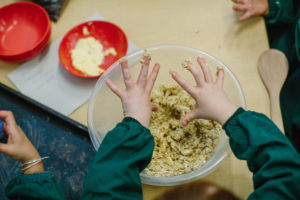How to be more sugar aware
To mark Sugar Awareness Week, our catering manager Pam discusses how to be more aware of our sugar intake and shares her tips to reduce the amount we use in our cooking.
Children in the UK are consuming double their daily intake of sugar each day, according to a 2018 study by Public Health England.
This means that children aged between four and ten years old are consuming an average of 13 cubes of sugar each day, even though the recommended amount is no more than five to six cubes.
In Britain, we are consuming too much sugar and we need to be more aware of what we are putting into our bodies, particularly where our children are concerned.
According to the NHS, up to 27% of our daily sugar intake comes from chocolate, sweets and jams. Chocolate spread is one of the worst offenders as it contains 57.1g of total sugar per 100g.
At Pilgrims we have recently introduced popcorn as a morning snack. The popcorn is popped in our kitchen and no sugar or salt is added so it’s a healthy and nutritious snack for the children to enjoy.
Many drinks also contain lots of sugar, with fizzy drinks such as cola containing 39 grams of sugar in a 12oz can. Although fruit juice is seen as a healthy alternative to other sugary soft drinks, it’s important to limit the amount you consume because of the amount of sugar it contains. It is recommended that children should only have 150ml of fruit juice or smoothies per day. It’s also important to make sure the fruit juice is fresh and contains no added sugar, because this can boost sugar levels significantly.
Sugar can also be found in a wide variety of savoury foods, including many sauces. Many supermarkets offer a ‘reduced sugar and salt’ alternative to help you reduce your sugar and salt intake, so it’s always worth looking out for these. All of our tomato sauces are made using carrots and courgettes which are blended in for extra goodness. You can download the recipe for our Meatballs in fresh tomato sauce here.
When cooking, many recipes also tell you to add a significant amount of sugar, particularly when you are baking cakes or sweet treats. I always recommend reducing the amount of sugar used when cooking. All the cakes and tray bakes we make in our kitchen at Pilgrims have had their recipe sugar intake quartered, but they still taste great. We have also added gojo berries into our flapjacks and chia seeds to our biscuits as hidden health boosters.
Instead of sweetened yoghurt we serve natural, unsweetened yoghurt and use a range of fresh fruit purees so the children can create their own flavours.
Although sugar in large quantities can be bad for you, it is also important as part of a balanced diet. Natural sugars in foods such as fruit contain the vitamins, minerals and nutrients that we need to stay healthy. This is why we have fresh fruit available all day so our pupils can choose it for breakfast, lunch or snack.
For more information about sugar and how to enjoy it as part of a balance diet, visit the NHS website.

